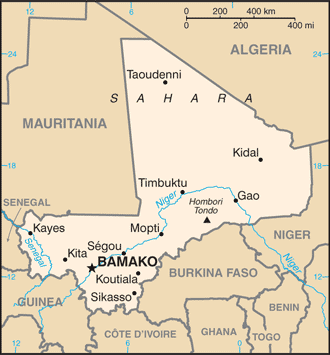State power is not as easy to exercise as you’d think, especially in Africa. From an article in last Sunday’s New York Times:
The radical Islamists who control northern Mali appear incapable of managing basic services — including electricity, water and schools — and in some cases are asking for the return of state functionaries to run them, according to a delegation that went to the region for talks recently.
The Islamists allied with Al Qaeda appear to have gained a firm military hold in the north, and have subdued the local population with a brutal application of Shariah law, including public beatings, amputation and a stoning death. (…)
But the Islamists’ grasp on administering the vast desert region, which is larger than France, seems much less secure, members of the delegation said. The delegates — members of an unofficial group of concerned citizens called the Coalition for Mali — unexpectedly found themselves listening to demands from the Islamists that the government in Bamako send back bureaucrats to run state services.
“They asked for the state to resume its functions, because it’s too complicated for them to manage,” said Daouda Maïga, who used to run a state development program in Kidal, a region of nearly 70,000 people before the Islamist takeover emptied it. “They are not used to running things.”
Looks like Ansar Dine — the radical Islamic group that controls northern Mali — bit off more than it could chew.
The article excerpted above brings to mind Jeffrey Herbst’s States and Power in Africa, in which the author offers an excellent discussion of how although African states usually enjoy external legitimacy (i.e., they are officially recognized by other states), they rarely if ever enjoy internal legitimacy (i.e., they have a hard time broadcasting their power within their own borders).
